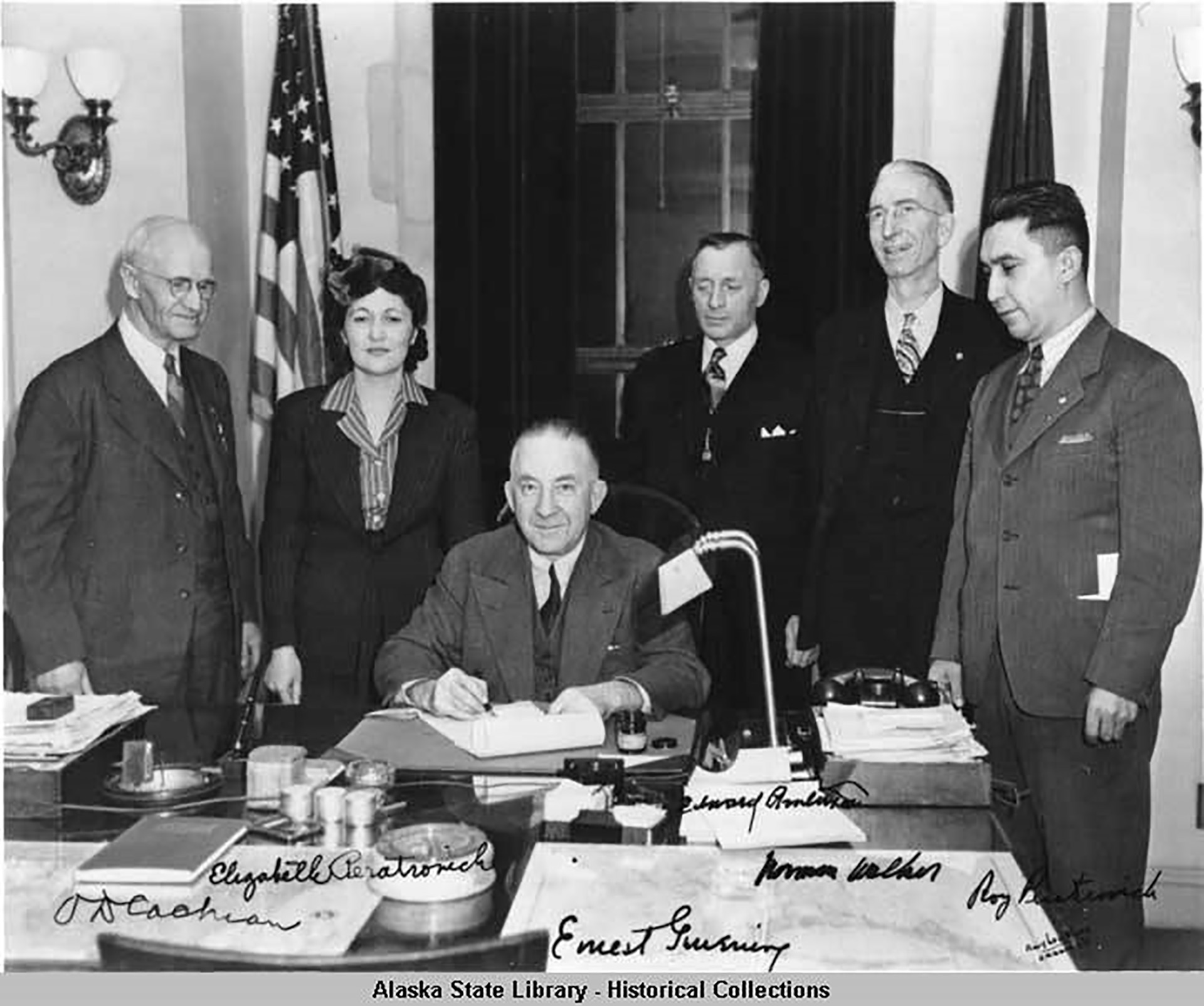
- Details
- By Levi Rickert
Today, February 16th, is Elizabeth Peratrovich Day in Alaska. Elizabeth Wanamaker Peratrovich (Tlingit) was a civil rights activist who is credited with pushing for the anti–discrimination law in the United States. Alaska Governor Mike Dunleavy signed a proclamation earlier this week officially declaring today as Elizabeth Peratrovich Day.
Almost two decades before the Civil Rights Act of 1964, Peratrovich was instrumental in passing the Anti-Discrimination Act of 1945 that ended legal discrimination against Alaska Native people.
The Act was passed before Alaska gained statehood, which caused Alaska to be the first state or territory in the country to have an anti-discrimination law.
Peratrovich, born in 1911 in St. Petersburg, Alaska, grew up during a time where signs outside of restaurants often read: “No Indians or dogs allowed.” As a young woman, witnessing this discrimination was the inspiration that set Peratrovich and her husband, Roy Peratrovich (Tlingit), on a lifelong endeavor to end discrimination against Natives. In 1941, they wrote a letter to their governor, asking him to remove the racist signs, which was ultimately the first step in their push towards the Anti-Discrimination Act.
In remarks to the National Congress of American Indians Executive Council Winter Session in Washington, D.C., on Wednesday, Rep. Mary Peltola (D-Alaska) said Peratrovich was an early civil rights leader who should be recognized nationally for the work she did. Peltola said her staff is working a on resolution to gain national recognition for Peratrovich.
“We urgently need more Elizabeth Peratrovichs willing to get involved, educate, and inspire,” Peltola said.
Governor Dunleavy’s proclamation said:
“Elizabeth and her husband, Roy, fought for their campaign tirelessly, and after four years of penning legislation, enlisting the help of other Alaska Natives, and lobbying territorial legislators for support, in 1945 their anti-discrimination bill passed the House and was sent to the Senate; and on February 16, 1945, after a two-hour long hearing, Elizabeth stood and delivered an impassioned and eloquent speech that garnered the support needed to pass the Anti-Discrimination Act of 1945.”
The proclamation said Peratrovich continued championing civil rights until her death on December 1, 1958, at the age of 47.
In celebration of Elizabeth Peratrovich Day, DNC Chair Jaime Harrison and DNC Native Caucus Chair Clara Pratte released on Friday, Feb. 16, 2024 the following statement:
“On Elizabeth Peratrovich Day, we celebrate the enduring legacy of a fearless leader who championed Indigenous rights and social justice. Elizabeth Peratrovich’s groundbreaking work, including her instrumental role in passing the country’s first anti-discrimination law in 1945, paved the way for progress and equality. She was also an active voice in the fight for voting rights, ensuring that Indigenous voices across Tribal communities are heard and respected in the democratic process.
“As our freedoms and rights are threatened by extremists, we look to Elizabeth’s trailblazing legacy for inspiration and as a reminder that we must never be afraid to fight on behalf of all our communities. Today and every day, we honor Elizabeth Peratrovich’s contributions and recommit ourselves to advancing Indigenous rights, combatting discrimination, and upholding the principles of equality and justice for all.”
The State of Alaska has recognized February 16 as Elizabeth Peratrovich Day since 1988. But in February 2023, the United States Senate recognized the holiday nationally, thanks to legislation introduced by Alaska Senators Dan Sullivan and Lisa Murkowski. Also, in 2020, the civil rights activist was commemorated on $1 coins for her contributions to the betterment of Alaska Natives for future generations.
Native News Online senior reporter Jenna Kunze contributed to this article.
More Stories Like This
Native News Weekly (August 25, 2024): D.C. BriefsUS Presidents in Their Own Words Concerning American Indians
Merry Christmas 2025
Navajo Man Faces Vehicular Homicide Charge After Child Killed at Navajo Nation Christmas Parade
Next on Native Bidaské: Lumbee Tribal Chairman John Lowery
Help us defend tribal sovereignty.
At Native News Online, our mission is rooted in telling the stories that strengthen sovereignty and uplift Indigenous voices — not just at year’s end, but every single day.
Because of your generosity last year, we were able to keep our reporters on the ground in tribal communities, at national gatherings and in the halls of Congress — covering the issues that matter most to Indian Country: sovereignty, culture, education, health and economic opportunity.
That support sustained us through a tough year in 2025. Now, as we look to the year ahead, we need your help right now to ensure warrior journalism remains strong — reporting that defends tribal sovereignty, amplifies Native truth, and holds power accountable.
 The stakes couldn't be higher. Your support keeps Native voices heard, Native stories told and Native sovereignty defended.
The stakes couldn't be higher. Your support keeps Native voices heard, Native stories told and Native sovereignty defended.
Stand with Warrior Journalism today.
Levi Rickert (Potawatomi), Editor & Publisher

